
Language Learning in Higher Education
Scope & Guideline
Cultivating excellence in language acquisition methodologies.
Introduction
Aims and Scopes
- Language Learning Strategies:
The journal emphasizes research on various language learning strategies employed by students, including their effectiveness and the factors influencing their use. This includes the exploration of cognitive, metacognitive, and socio-affective strategies. - Integration of Technology in Language Education:
A core area of focus is the integration of digital technologies and online resources in language learning. This encompasses studies on the impact of technology on student engagement, learning outcomes, and the development of digital literacy skills. - Cultural and Intercultural Competence:
The journal addresses the importance of cultural awareness and intercultural communication in language education. Research often explores how language learning can foster intercultural competence among students. - Teacher Perspectives and Professional Development:
Research includes investigations into teachers' perceptions, training, and professional development in language education. This area highlights the role of educators in shaping effective language learning environments. - Learner Autonomy and Agency:
The promotion of learner autonomy is a significant theme, focusing on how educational practices can empower students to take charge of their learning processes and develop critical thinking skills. - Sustainability in Language Education:
The journal contributes to discussions on sustainability within the curriculum, exploring how language education can incorporate principles of sustainability and environmental awareness.
Trending and Emerging
- Gamification in Language Learning:
Recent publications have increasingly focused on gamification strategies to enhance student engagement and motivation in language learning contexts. - The Impact of Artificial Intelligence:
There is a growing interest in exploring the implications of artificial intelligence tools, such as ChatGPT, on language learning and teaching, including their potential benefits and challenges. - Intercultural Communication and Global Competence:
Research is trending towards fostering intercultural communication skills as essential components of language education, preparing students for a globalized world. - Sustainable Language Learning Practices:
Emerging themes include sustainability in language teaching, with studies examining how language education can promote environmental awareness and responsible citizenship. - Digital Literacy and Multimodal Learning:
The integration of digital literacy into language learning is gaining traction, with a focus on multimodal approaches that leverage various forms of media and technology.
Declining or Waning
- Traditional Language Teaching Methods:
There is a noticeable decline in studies focusing solely on traditional language teaching methods, as the field shifts towards more innovative and technology-integrated approaches. - Focus on Native Speaker Norms:
Research centered on native speaker norms and standards of language proficiency is diminishing, reflecting a growing recognition of plurilingualism and the value of diverse language varieties. - Standardized Testing and Assessment:
There is a waning interest in conventional standardized testing as a primary measure of language proficiency, with a shift towards more holistic and formative assessment practices. - Monolingual Language Instruction:
The journal has seen fewer studies addressing monolingual language instruction, indicating a move towards multilingual and translanguaging pedagogies. - Teacher-Centered Pedagogy:
Research emphasizing teacher-centered approaches is less prevalent, as the focus increasingly shifts to learner-centered methodologies that promote active engagement.
Similar Journals
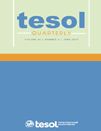
TESOL QUARTERLY
Advancing Language Education through Rigorous ResearchTESOL Quarterly, published by Wiley, is a premier academic journal in the fields of Education and Linguistics, noted for its significant contributions to the study of Teaching English to Speakers of Other Languages. Since its inception in 1981, this journal has established itself as a vital platform for researchers and educators, emphasizing empirical studies, innovative teaching practices, and critical reviews that inform policy and pedagogy. With an impressive impact factor, it consistently ranks in the Q1 Quartile across multiple categories in both Education and Linguistics, highlighting its influence and reach within the scholarly community. The journal boasts strong Scopus rankings, placing it in the top 96th percentile among related publications, further affirming its essential role in disseminating cutting-edge research. Although it does not offer open access, TESOL Quarterly remains dedicated to promoting high-quality scholarship that advances the understanding of language education practices globally.
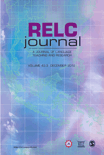
RELC Journal
Leading the Way in Linguistic and Educational ExcellenceRELC Journal, published by SAGE Publications Ltd, stands as a leading platform in the fields of Education and Linguistics, boasting an impressive Q1 ranking in both categories according to the latest metrics. Established in 1970 and continuing its commitment to academic excellence through 2024, the journal features rigorous peer-reviewed research that explores the intersections of language, culture, and pedagogy. With a notable Scopus ranking that places it in the 98th percentile for both Language and Linguistics (Rank #16/1088) and Education (Rank #91/1543), the RELC Journal is essential for scholars, educators, and practitioners seeking to contribute to and stay abreast of cutting-edge developments in their respective fields. Although currently not open access, the journal remains accessible to a diverse audience and invites contributions that challenge conventional perspectives and inspire innovative practices in language education.
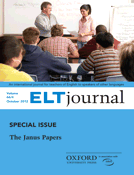
ELT Journal
Bridging Theory and Practice in ELTELT Journal, published by Oxford University Press, is a premier academic journal dedicated to the fields of Educational Psychology, Linguistics, and Language, boasting an esteemed Q1 category ranking across these disciplines. Since its inception in 1946, the journal has served as a vital platform for researchers and educators, offering insights into English Language Teaching (ELT) and the evolving pedagogical practices that influence language acquisition and literacy development. With an impressive Scopus ranking placing it in the 95th percentile within the Arts and Humanities (Linguistics and Language), ELT Journal not only contributes to academic discourse but also bridges theoretical frameworks with practical applications in educational settings. Although it does not currently offer Open Access, the journal remains essential for professionals and students alike, eager to stay abreast of the latest research trends and innovations in the global ELT landscape. For those committed to advancing their understanding of language education, the journal's diverse range of articles and case studies provide invaluable resources.
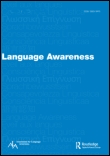
Language Awareness
Connecting Theory and Practice in Language UseLanguage Awareness is a leading academic journal published by Routledge Journals, Taylor & Francis Ltd, focusing on the intersection of language, education, and linguistic theory. Since its inception in 1992, this esteemed journal has provided a platform for scholarly discourse and research advancement, boasting a strong impact within its field, as indicated by its Q1 quartile rankings in both Education and Linguistics and Language as of 2023. The journal's commitment to promoting awareness and understanding of language use in diverse contexts is highlighted through rigorous peer-reviewed articles that cater to researchers, practitioners, and educators. With an impressive positioning in various Scopus categories—ranking 95th in Arts and Humanities, and 111th in Social Sciences—it ensures access to high-quality research that influences both pedagogy and linguistic methodologies. Although it does not offer Open Access options, its content remains essential for those passionate about linguistic research and educational innovation.

Journal of Academic Language and Learning
Catalyzing pedagogical innovation in language learning.Journal of Academic Language and Learning is an esteemed publication dedicated to the exploration and analysis of language use in academic contexts, particularly focused on promoting pedagogical practices and research methodologies that enhance learning outcomes. Published by ASSOC ACAD LANGUAGE LEARNING, this journal serves as a vital resource for educators, researchers, and students seeking to understand the complexities of academic language development. With its strong emphasis on accessibility and engagement, the journal publishes high-quality research that bridges theory and practice, facilitating dialogue among professionals in the field. The journal's comprehensive scope includes topics such as language acquisition, literacy practices, and assessment strategies, making it an integral platform for those committed to advancing academic language learning. While specific impact factors and access options are currently unavailable, its commitment to open discourse ensures that significant contributions to the field are actively shared and disseminated. The Journal of Academic Language and Learning is poised to impact language learning methodologies, equipping its readership with the insights necessary for fostering academic excellence.
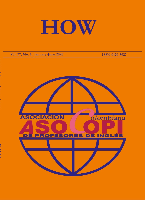
How-A Colombian Journal for Teachers of English
Fostering Innovation in English Language Instruction.How: A Colombian Journal for Teachers of English is a prestigious, peer-reviewed publication dedicated to advancing the field of English language teaching in Colombia and beyond. Established by the ASOC COLOMBIANA PROFESORES INGLES, this journal has embraced an Open Access model since 2014, ensuring that innovative research and teaching methodologies are accessible to a global audience. With a focus on pedagogical strategies, curriculum development, and language acquisition, How aims to foster community among educators, researchers, and practitioners dedicated to improving English language instruction. The journal's commitment to high-quality scholarship and practical applications makes it an indispensable resource for professionals seeking to enhance their teaching practices. Housed in Bogotá, Colombia, How reflects the dynamic landscape of English education in Latin America, contributing significantly to both regional and international discourse.
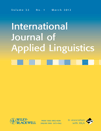
International Journal of Applied Linguistics
Connecting Theory and Practice in Applied LinguisticsInternational Journal of Applied Linguistics, published by WILEY, is a premier platform for cutting-edge research in the field of applied linguistics. With a notable Impact Factor and ranked in the top Q1 quartile of linguistics and language, this journal serves as an essential resource for scholars, practitioners, and students. The journal’s wide-ranging scope includes various subfields such as language acquisition, language education, sociolinguistics, and discourse analysis, fostering multidisciplinary approaches to language studies. It has achieved a significant Scopus Rank, placing it in the 90th percentile for both Arts and Humanities as well as Social Sciences categories, reflecting its high visibility and influence in the academic community. The International Journal of Applied Linguistics is committed to advancing the understanding of language use in real-world contexts through rigorously peer-reviewed articles that contribute to both theory and practical applications. While it is not an open-access journal, it remains a highly respected publication for researchers looking to disseminate and acquire knowledge in applied linguistics.

Yazyk i Kultura-Language and Culture
Fostering Dialogue Between Linguistics and CultureYazyk i Kultura - Language and Culture is a distinguished academic journal dedicated to the exploration of linguistic and cultural issues across various contexts. Published by TOMSK STATE UNIVERSITY, this journal serves as a vital resource for researchers, scholars, and students interested in the intricate interplay between language and culture. With an ISSN of 1999-6195 and an E-ISSN of 2311-3235, it engages a global community in disseminating high-quality research articles, reviews, and theoretical discussions. Although the journal is not categorized as Open Access, it ensures that its contents contribute significantly to the academic discourse within the fields of linguistics, cultural studies, and social sciences. With a commitment to promoting scholarly research, Yazyk i Kultura is positioned to shape contemporary conversations about language's role in cultural dynamics, making it an essential outlet for those dedicated to advancing understanding in this interdisciplinary domain.

Journal of Research in Applied Linguistics
Transforming Language Education and SociolinguisticsJournal of Research in Applied Linguistics is an esteemed academic journal published by Shahid Chamran University Ahvaz, Iran, focusing on the dynamic field of linguistics and language studies. With an ISSN of 2345-3303 and an E-ISSN of 2588-3887, the journal has established itself as a valuable resource for researchers and professionals aiming to explore diverse issues related to applied linguistics, including language acquisition, pedagogy, and sociolinguistic interactions. As part of a robust academic community since its inception in 2017, it is recognized with a Q2 quartile ranking in the world of linguistics and achieved impressive Scopus ranks reflective of its growing impact, particularly within the arts and humanities. The journal embraces an open access policy, enhancing its reach and availability to a broad audience. Researchers, educators, and students alike will find in the Journal of Research in Applied Linguistics a critical platform for dialogue, innovation, and contribution to the evolving landscape of language research.

LFE-Revista de Lenguas para Fines Especificos
Bridging Theory and Practice in Language EducationLFE-Revista de Lenguas para Fines Especificos is a distinguished academic journal focused on the field of applied linguistics and language education, published by UNIV LAS PALMAS GRAN CANARIA, SERV PUBL & DIF CIENT PARQUE CIENT. Established in 1993, this Open Access journal promotes the dissemination of research on specific purposes in language studies, making it an invaluable resource for researchers, educators, and students alike. Based in Spain, it serves an international audience interested in the intersection of language acquisition, pedagogy, and professional communication. Despite its recent entry into Scopus with competitive rankings in Social Sciences, particularly in Linguistics and Language and Education, the journal aims to continually enhance its impact by inviting innovative contributions that explore contemporary challenges and methodologies in language teaching and learning. Researchers are encouraged to tap into this growing repository of knowledge, which is easily accessible to foster collaborative and interdisciplinary dialogues within the field.